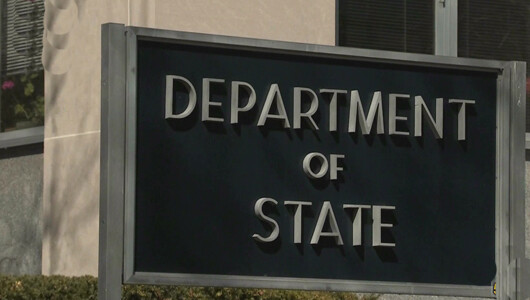hankyoreh
Links to other country sites 다른 나라 사이트 링크
Hopes for improved inter-Korean relations are flagging

After some positive signs around the beginning of this year, hopes for a thaw in inter-Korean relations are dimming once again amid time-worn questions over the relationship between improved ties and North Korean denuclearization and Seoul’s flagging enthusiasm over the prospect of improvements.
“There is no daylight between Seoul and Washington over efforts to improve inter-Korean relations,” an official with the US State Department Bureau of Public Affairs said when asked by the Hankyoreh on Jan. 14 about Washington’s position on inter-Korean dialogue.
“Progress in inter-Korean relations could be important in terms of bringing North Korea back to sincere and credible denuclearization negotiations,” the official added.
The remarks could be read as showing support for improvements in inter-Korean ties, while indirectly stressing the importance of having denuclearization be part of the agenda in any dialogue.
These comments could also hint that Seoul and Washington may have coordinated their position on tying progress in inter-Korean relations to the denuclearization issue. Washington responded unenthusiastically to Seoul’s dialogue overtures to Pyongyang on Dec. 29, encouraging people to “ask the South Korean government for the details.” The response was seen as signaling US concerns that its main focus, denuclearization, would be neglected by South Korea.
Diplomatic sources in Washington D.C. suggested that the US response may have been one factor behind President Park Geun-hye’s mention of denuclearization in opening remarks in her New Year’s address.
“The attitude from the US is basically the same thing as the ‘positive feedback loop’ between inter-Korean ties and denuclearization that President Park talked about,” said a diplomatic source in Washington.
The source also mentioned the possibility of Seoul lifting the May 24 Measures, a ban on trade and interchange with North Korea imposed in the wake of the 2010 sinking of the ROKS Cheonan warship.
“Those measures were imposed independently by the South Korean government, so the US is not going to object if the South Korean government decides on its own that the conditions for lifting them have been met,” the source said.
But the source added, “There may be difficulties in terms of doing large-scale economic cooperation efforts with support from the South Korean government.”
While both Seoul and Washington agree on the basic principle of a “positive feedback loop,” the Park administration is likely to run into trouble translating the idea into actual policy. There could be an interception from the US - as with Pyongyang and Tokyo’s negotiations on the issue of Japanese abducted by North Korea - if South and North make progress in denuclearization by downplaying the issue in inter-Korean dialogue. Meanwhile, North Korea appears unlikely to go along with improving inter-Korean relations as long as denuclearization remains a central issue. In either case, the pace of improvements is likely to be hampered.
The Park administration’s commitment to making a breakthrough will be crucial. But even within Seoul, enthusiasm is flagging amid Pyongyang’s long silence, with signs that officials are leaning toward slowing the push to improve relations. The attitude has prompted some pessimists to predict no substantive improvements in relations will happen beyond a possible reunion event for divided families.
By Park Hyun, Washington correspondent, and Yi Yong-in, staff reporter
Please direct questions or comments to [english@hani.co.kr]

Editorial・opinion
![[Column] Is Korean democracy really regressing? [Column] Is Korean democracy really regressing?](https://flexible.img.hani.co.kr/flexible/normal/500/300/imgdb/original/2024/0705/2917201664129137.jpg) [Column] Is Korean democracy really regressing?
[Column] Is Korean democracy really regressing?![[Column] How tragedy pervades weak links in Korean labor [Column] How tragedy pervades weak links in Korean labor](https://flexible.img.hani.co.kr/flexible/normal/500/300/imgdb/original/2024/0703/8717199957128458.jpg) [Column] How tragedy pervades weak links in Korean labor
[Column] How tragedy pervades weak links in Korean labor- [Column] How opposing war became a far-right policy
- [Editorial] Korea needs to adjust diplomatic course in preparation for a Trump comeback
- [Editorial] Silence won’t save Yoon
- [Column] The miscalculations that started the Korean War mustn’t be repeated
- [Correspondent’s column] China-Europe relations tested once more by EV war
- [Correspondent’s column] Who really created the new ‘axis of evil’?
- [Editorial] Exploiting foreign domestic workers won’t solve Korea’s birth rate problem
- [Column] Kim and Putin’s new world order
Most viewed articles
- 110 days of torture: Korean mental patient’s restraints only removed after death
- 2Months after outcry over “torture devices,” Justice Ministry proposes more restraints for immigratio
- 3Beleaguered economy could stymie Japan’s efforts to buoy the yen
- 4[Column] Is Korean democracy really regressing?
- 5Koreans are getting taller, but half of Korean men are now considered obese
- 6[Column] How tragedy pervades weak links in Korean labor
- 7Former bodyguard’s dark tale of marriage to Samsung royalty
- 8Real-life heroes of “A Taxi Driver” pass away without having reunited
- 9[Editorial] Exploiting foreign domestic workers won’t solve Korea’s birth rate problem
- 10Democrats ride wave of 1M signature petition for Yoon to be impeached